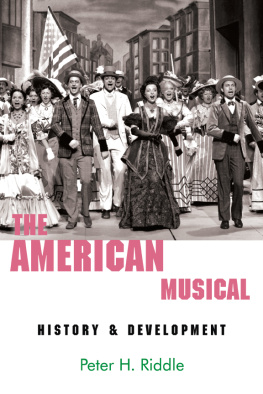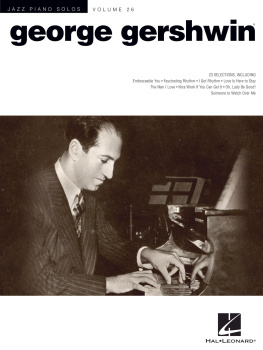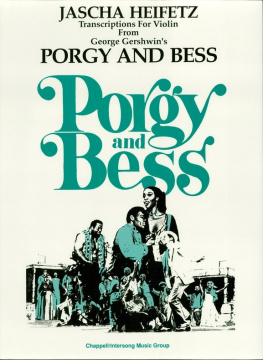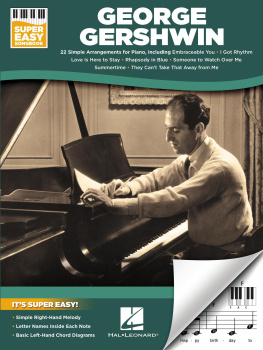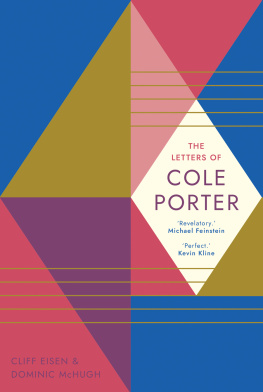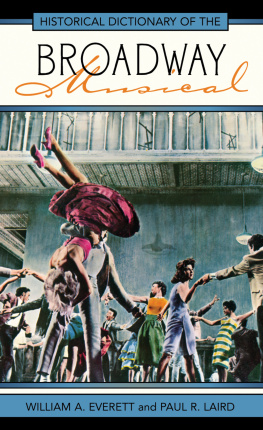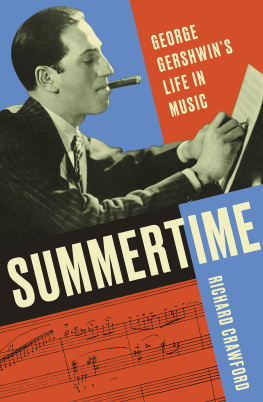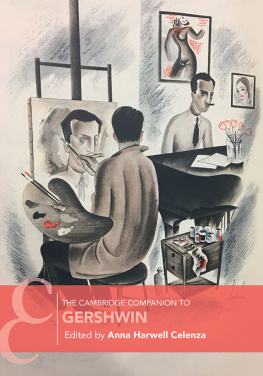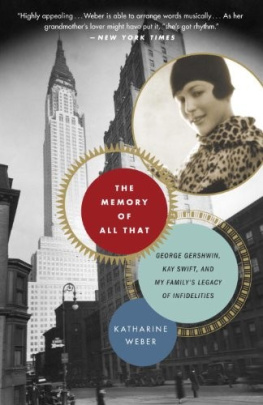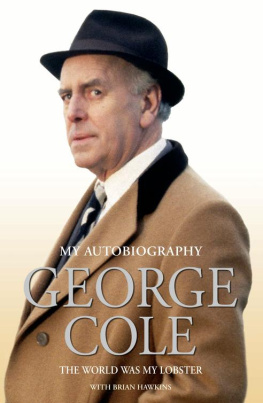
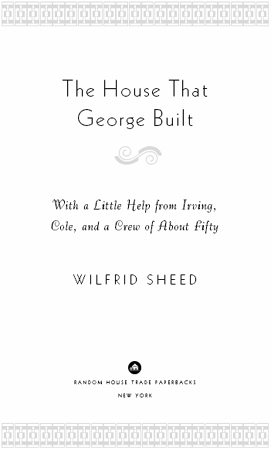
CONTENTS
Part One
The Piano Era
Part Two
ConsequencesThe Great Jazz Songwriters
Part Three
The StageBroadway Swings
Part Four
HollywoodThe Sugar Daddy
Part Five
Survival on BroadwayThe Curtain That Wont Stay Down
To the memory of
Harry Warren
A NOTE ON SOURCES
What follows is a labor of love, not a work of scholarship, which means that I have been researching it for most of my life without knowing itstarting at the family piano, singing and memorizing Irving Berlins ragtime spin-offs, and ending with the last phone conversation with the last fellow addict fifteen minutes ago.
Although Ive read every single word I could get my hands on, Ill spare you the list of out-of-date books, articles, and quotations that this represents in favor of a short list of people Ive talked to, and in some cases sung with. The proper medium for studying the American song is, after all, neither the lecture nor the library but the sing-along and the rap session, or as it used to be called, the bull session, with its overtones of the tall story and the overconfident assertion.
In this offbeat branch of learning, the best research comes from the best bulls, and I have talked to some of the finest, including a handful who actually wrote some of the songs, one of whom tends to lead to another. In the late half of the 1960s, for instance, I lucked into the same building as the great lyricist Yip Harburg, and became, as one must with Yip, his devoted friend and fan.
Yip was never content just to leave the building and go on about his business. He invariably lingered in the lobby or in the open elevator doorway, pulling bits of paper out of his pockets, on which hed jotted some verses about the days news, and reading them with glee, or else telling me how his friend Harold Arlen was coping with his recent depressive breakdown. Mostly, though, he just liked to talk politics, so I was grateful that his other great pal and partner, Burton Lane, was also happy to talk about songs as long as I wanted, especially if the topic was Judy Garland, whom he discovered, or the Gershwins, who discovered him.
And it was there I also met a (recovered) Harold Arlen, quoted herein, and Arthur Schwartz, who told me how his partner Howard Dietz had greeted some life crisis or other with the repeated phrase What is life but dancing in the dark? So, he said, I dashed off the tune in twenty minutes. And I thought of the unusual soliloquy in the middle of that song (What though love is old, what though song is old? etc.) and I asked if that only took twenty minutes, and Arthur conceded that it actually took three weeks. (Songwriters estimates of these things seem mostly designed to make a point. Irving Caesars whole career couldnt have taken more than about an hour and a half, to hear him tell of it.)
Other great-talking writers were the lyricist-librettists Betty Comden and Adolph Green, whose work on Singin in the Rain had made them both scholars of early screen musicals, and the lyricist Ed Eliscu, who had actually gone out there in the old days and lived the songwriting life.
The multiply gifted Stephen Sondheim told me over drinks what was wrong with Ira Gershwin, while Jerry Lieber, the rock poet, told me, over other drinks, what was good about him. And I agreed with both of them.
Another great source of information and atmosphere were a handful of songwriters grown children, including Mary Ellin Barrett, whom I first knew as the excellent book reviewer at Cosmopolitan and only later as Irving Berlins daughter and the author of an invaluable book about him; and Shana Alexander, the highly successful writer and daughter of Milton Happy Days Are Here Again Ager, who had happy memories of her various uncles, Jerry (Kern), Harold (Arlen), and Harry (Warren). Shana also introduced me to her charming father, who told me that Ira Gershwin was upset about something Id written (funny how he kept coming up). The singer Margaret Whiting didnt remember as much as Id hoped about her father, Richard, but more than made up for it with her picture of Johnny Mercer, who virtually adopted her after Richards early death. And I also met Mary Rodgers, Ellen Donaldson, and Irving Berlins two other daughters, Linda and Elizabeth, who proved if nothing else that songwriters went in for girl children, and charming ones too. Over and against this, Hoagy Carmichael Jr. was also charming, and helpful and cooperative. But Hoagy had written two rich memoirs himself, The Stardust Road and Sometimes I Wonder, and I didnt want to make the whole book about him. SoI still owe Hoagy Jr. a phone call.
Another son I met was Dorothy Fieldss only one, David Lahm, who became a first-rate cocktail pianist and gave me my jolliest evening ever by playing every song I could think of at a friends birthday party, thus providing me the only chance Ive ever had to sing some of those old lyrics that we all memorized automatically back then. And Michael Feinstein, who had served as an archivist to both the Gershwins and Harry Warren before he himself became a star, provided some great evenings too, playing and chatting and incidentally helping me to imagine Warren as if hed been a relative of mine. Uncle Harry, indeed. Michael can also stand in for the gallant army of cabaret artists who crisscross the land like religious missionaries on a great crusade. All the ones Ive talked to have doubled as scholars of the great songs and enthusiasts for their cause, spectacularly so in the case of Mary Cleere Haran.
And finally there are my two talkers-in-chief, Jonathan Schwartz and Jim Lowe, a couple of professionals who both jockeyed the classic discs for years at the legendary radio station WNEW, and have continued ever since to serve the old-time religion of great American songs every way they know how. Jonathan has compared our very first conversation (about songs, of course) to the longest baseball game ever played, a record weve broken a couple of times since, and Jim, as a neighbor, has hosted some of the best bull sessions of the twenty-first centurywith himself at the piano, needing only a jug of moonshine on top of it to round out the honky-tonk scene. (In fact, I cant swear I didnt see one.)
I like to think of the book that follows as my contribution to the great bull session in the sky. So feel free to scribble in the margin in agreement or raucous disagreement.
If this great session ever settles anything, it has failed. But theres no chance of that. New verdicts are never more than just a song away. And the next song is no further away than your memory.
I must have sung a couple of hundred songs to myself in writing this book, and I hope its contagious. And to invoke the mighty Irving Berlin for a moment, if the resulting book, or any part of it, starts you tapping your feet, Im happy beyond words.
INTRODUCTION
I Could Write a Book if They Asked Me
The line has been stolen so often that I might as well steal it again. This book, as somebody once said, was not finished, it was abandonedand abandoned not just once in this case, but several times.
My most serious prior assault on this subject was to be a collaboration with the late Alec Wilder, who had himself just written the greatest of all books ever on the American song. Still, Alec was entirely in favor of helping a friend write another one. Our original scheme was simplicity itself, simply to assemble Johnny Mercer, and build the whole thing around him, in a series of conversations with fellow songwriters that would tell the whole story, from Irving Berlin to Burt Bacharach, and from ragtime to R & B and wherever we were that year.
Next page


